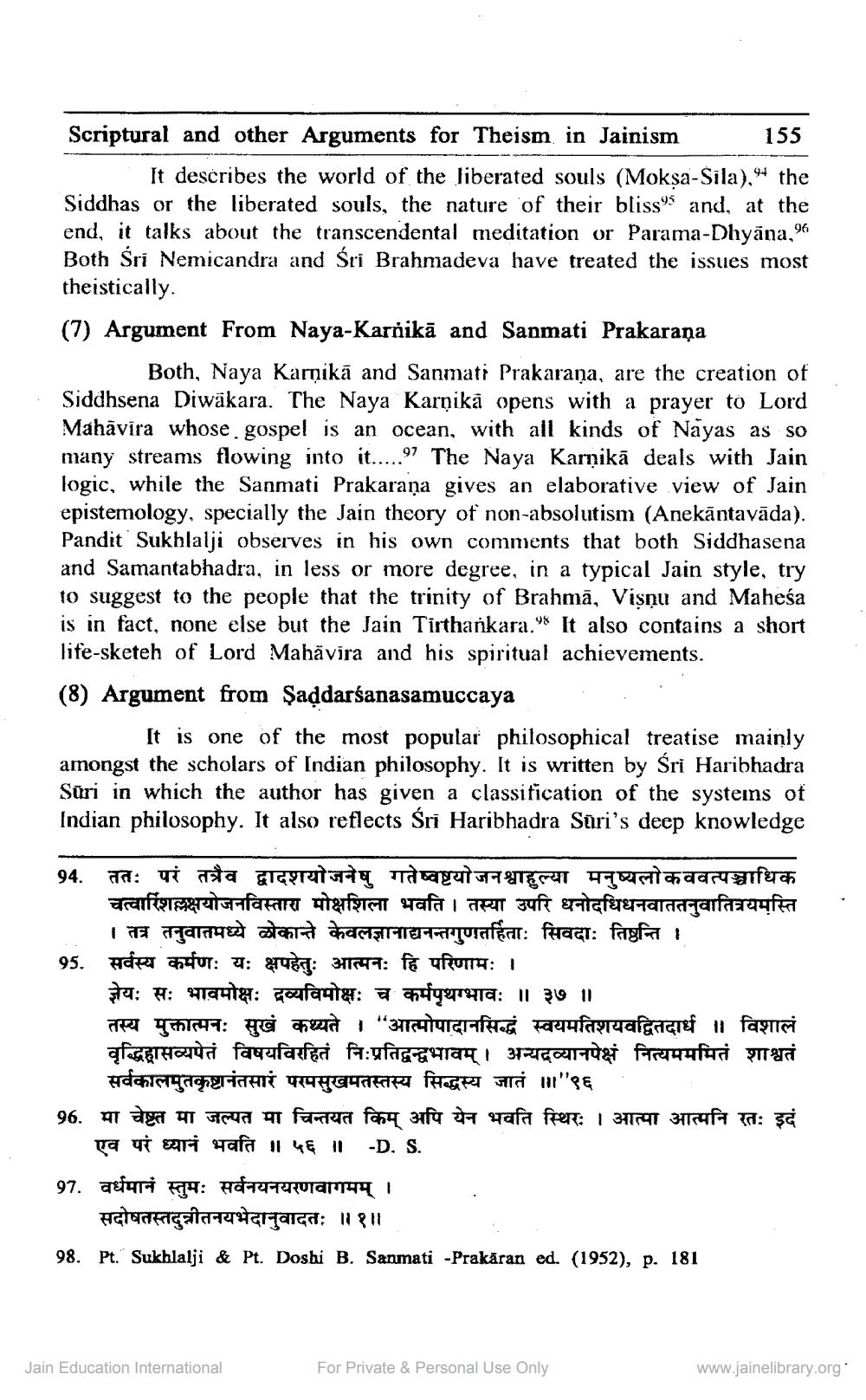________________
Scriptural and other Arguments for Theism in Jainism 155
It describes the world of the liberated souls (Moksa-Sila),94 the Siddhas or the liberated souls, the nature of their blisss and. at the end, it talks about the transcendental meditation or Parama-Dhyana,96 Both Sri Nemicandra and Sri Brahmadeva have treated the issues most theistically. (7) Argument From Naya-Kariikā and Sanmati Prakarana
Both, Naya Karmikā and Sanmati Prakarana, are the creation of Siddhsena Diwākara. The Naya Karņikā opens with a prayer to Lord Mahāvira whose gospel is an ocean, with all kinds of Nayas as so many streams flowing into it.....97 The Naya Karnikā deals with Jain logic, while the Sanmati Prakaraņa gives an elaborative view of Jain epistemology, specially the Jain theory of non-absolutism (Anekāntavāda). Pandit Sukhlalji observes in his own comments that both Siddhasena and Samantabhadra, in less or more degree, in a typical Jain style, try to suggest to the people that the trinity of Brahmā, Vişnu and Mahesa is in fact, none else but the Jain Tirthankara." It also contains a short life-sketeh of Lord Mahavira and his spiritual achievements. (8) Argument from Saddarsanasamuccaya
It is one of the most popular philosophical treatise mainly amongst the scholars of Indian philosophy. It is written by Sri Haribhadra Sūri in which the author has given a classification of the systems of Indian philosophy. It also reflects Sri Haribhadra Süri's deep knowledge
94. ततः परं तत्रैव द्वादशयोजनेषु गतेष्वष्टयोजनश्वाहुल्या मनुष्यलोकववत्पञ्चाधिक
चत्वारिंशल्लक्षयोजनविस्तारा मोक्षशिला भवति । तस्या उपरि धनोदधिधनवाततनुवातित्रयमस्ति
। तत्र तनुवातमध्ये लोकान्ते केवलज्ञानाद्यनन्तगुणतर्हिता: सिवदाः तिष्ठन्ति । 95. सर्वस्य कर्मणः यः क्षपहेतुः आत्मनः हि परिणामः ।
ज्ञेयः सः भावमोक्षः द्रव्यविमोक्षः च कर्मपृथग्भावः ॥ ३७ ॥ तस्य मुक्तात्मनः सुखं कथ्यते । “आत्मोपादानसिद्धं स्वयमतिशयवद्वितदार्ध ॥ विशालं वृद्धिहासव्यपेतं विषयविरहितं नि:प्रतिद्वन्द्वभावम्। अन्यदव्यानपेक्षं नित्यमममितं शाश्वतं
सर्वकालमुतकृष्टानंतसारं परमसुखमतस्तस्य सिद्धस्य जातं ॥"९६ 96. मा चेष्टत मा जल्पत मा चिन्तयत किम् अपि येन भवति स्थिरः । आत्मा आत्मनि रतः इदं
एव परं ध्यानं भवति ॥ ५६ ॥ -D. S. 97. वर्धमानं स्तुमः सर्वनयनयरणवागमम् ।
सदोषतस्तदुन्नीतनयभेदानुवादतः ॥१॥ 98. Pt. Sukhlalji & Pt. Doshi B. Sanmati - Prakāran ed. (1952), p. 181
Jain Education International
For Private & Personal Use Only
www.jainelibrary.org




